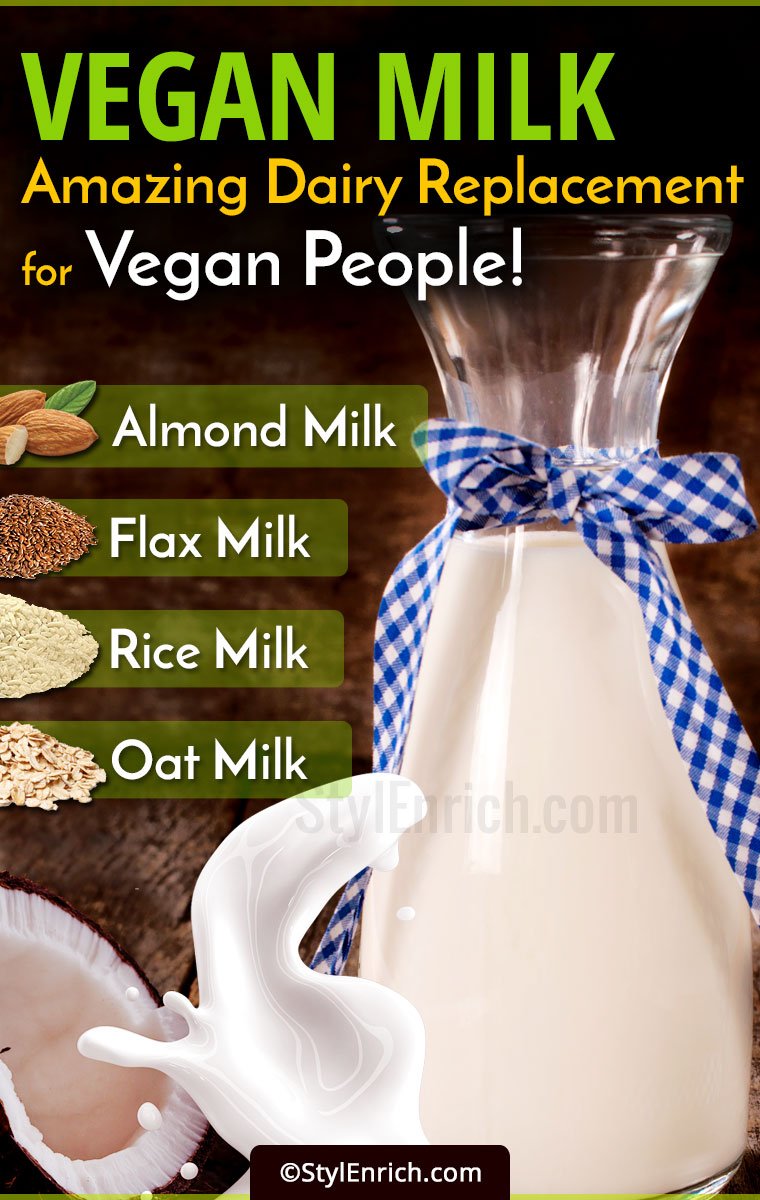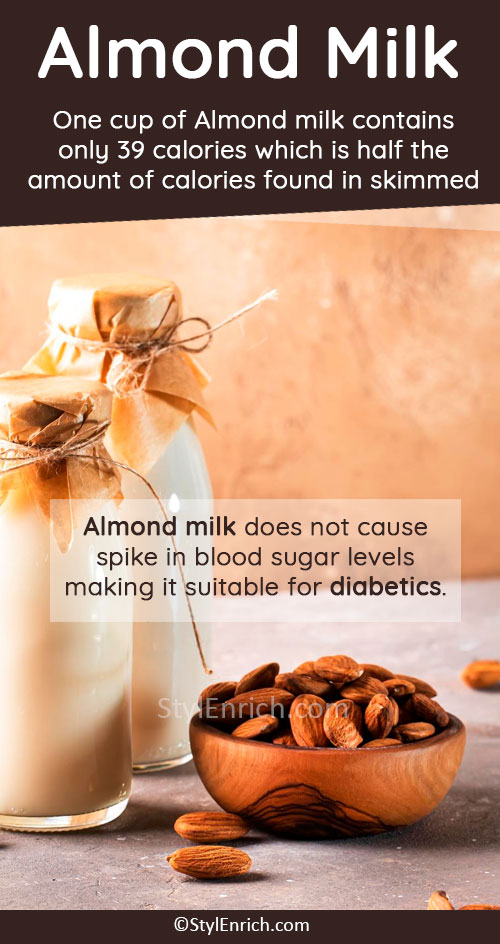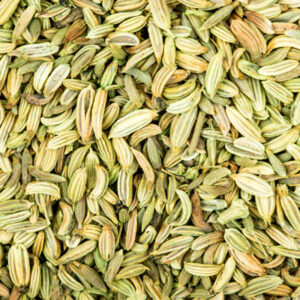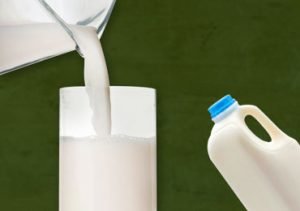Do you love drinking dairy products like Milk and curd? Here are some useful facts that you need to know –
- Picking a nondairy alternative even if you are a vegetarian or non-vegetarian is always beneficial for us.
- There are varieties of milk available in the market like almond milk, soy milk, rice milk, oat milk etc.
- Dairy free milk substitutes can eliminate a number of issues that you have been facing if you were having regular milk.
- Vegan milk can be made easily and economically at home with the addition of flavors.
With rise in dairy allergies and high levels of saturated fats and cholesterol levels in milk, people are contemplating of incorporating healthiest alternative to dairy products. We used to have milk only from cows and goats but nowadays you can obtain milk from nuts, seeds, beans and grains.
Vegan milk has been utilized for cooking, baking and drinking purpose. Soy milk, rice milk and almond milk are gaining its popularity for dairy substitutes. Before vegan milk used to be available in small tetra packs but now it is prepared and stored in large milk cartons and kept alongside the regular milk. Every super- markets keep brands of these vegan milk. If air tight and closed, this milk will stay for a year but if opened, it must be refrigerated and finished within a week or so.
Let’s take a tour of which vegan milk is available and how it is beneficial.
Vegan Milk
1. Almond Milk
Almond milk is made by grinding almonds with water and then straining the mixture to remove the solids. Its rich texture and nutty flavor make it suitable for lattes. Although almonds contain 50% fat and has high calories, almond milk is low in calories. Producers prepare almond milk diluted with water to make the fat content similar to low-fat milk. One cup of almond milk contains only 39 calories which is half the amount of calories found in skim milk or no-fat milk. Sugar-free almond milk is a low carbohydrate beverage coming up to only 0.6 % per cup. However few products contain added sugar, which can be avoided if you are concerned by your waistline. Almond milk does not cause spike in blood sugar levels making it suitable for diabetics.
Being dairy free, almond milk is suitable milk replacement for people with lactose intolerance. Almond milk is high in Vitamin E and provides healthy fats thus making it suitable for the healthy heart.
2. Soy Milk
Soy milk is produced by soaking the dried soy beans, grinding them in water, boiling the mixture and filtering the residues. A 100 ml serving provides 80 calories and 7 grams of sugar per cup. Apart from this, the mono unsaturated fatty acids in soy milk can inhibit the intestinal absorption of fat thus making it perfect for weight loss. Soy milk consists of unsaturated fats with zero cholesterol.
It helps to reduce the Low-Density Lipoprotein and triglyceride levels and improve the High-Density Lipoprotein. Soy milk is an ideal drink for people who have the family history of coronary heart disease. The phytoestrogens in soy milk help in calcium absorption and prevent the loss of bone mass. Each cup of unsweetened and plain soy milk contains 7 gram of protein, hence including soymilk as a source of protein in the diet is always a good idea.
3. Rice Milk
Rice milk is low in fat which makes it a milk substitute for baking. Rice milk is made from boiled rice, brown rice syrup and brown rice starch. It is popular among vegans as it contains no animal products and is good for people suffering from lactose intolerance. However Rice milk does not contain as much calcium and protein as cow’s milk. Hence if you are planning to substitute cow’s milk with rice milk, need to include more protein in your diet from other sources. Most commercial brands of rice milk are fortified with Calcium, Vitamin B12, niacin, Vitamin A, D and iron. One cup of rice milk contains 140 calories and about 3 grams of fat.
But unfortified rice milk does not contain vitamins and minerals. Hence it is advisable to have fortified milk which contains vitamins and minerals as equal to a cup of cow’s milk. Since rice is high in starch, so is rice milk. About a cup of rice milk contains 33 gms carbohydrates, 3 to 4 times the amount in milk or soy milk. Hence in diabetes, consuming rice milk can lead to sugar over load. It would be then better to have soy milk or almond milk.
4. Oat Milk
Oat milk provides essential nutrients which are made of presoaked oat groats in which the hulled grains are broken into small fragments. Oat milk provides 36 percent RDA of calcium. Oat milk contains 10 percent RDA of Vitamin A which is twice as much as cow’s milk. A serving oat milk also contains 10 percent of RDA of iron. Being low in fat and calories, oat milk is good for healthy weight achievers. The soluble and insoluble fiber is present in oat milk which promotes a healthy digestion, prevents constipation and increase satiety.
Oat milk also has skin cleansing properties and helps to repair the hair. Oat milk contains a nutrient called beta glucan which helps to strengthen the immune system. It enhances the viscosity of the foods processed by the gut and hence helps in slow absorption of carbohydrates in the body. Hence consumption of oat milk is beneficial for diabetes.
5. Flax Milk
The most recent non – dairy milk to hit the stores is the flax milk. Flax milk contains Omega 3 fatty acids from cold pressed flax oil which helps to prevent heart diseases, cancer and stroke. Flax milk is the best alternative for milk especially if you are allergic to soy. Flax milk is also free from top eight allergens that can make flax milk more preferable milk alternative. Flax milk can be fortified with Vitamin A, Vitamin B12 and D and even calcium making it even better choice for non-dairy milk alternative. However, the major downside with flax milk is it contains no protein. But this can be solved if we make a point to include plant based protein foods like beans, tofu, lentils and grains as a part of the balanced diet.
Meanwhile here is some information about benefits of drinking Camel Milk.
Thus things are getting different when the different array of milk is coming up which can be better than cow’s milk. Cow’s milk has a number of downsides like the addition of chemicals and hormones, the presence of milk sugar called lactose which is not suitable for lactose intolerant individuals, high level of saturated fats which is linked to a number of issues like obesity, diabetes, coronary artery disease and eczema.
However, that doesn’t mean that we need to chuck out dairy or dairy products totally.The goodness of protein and calcium is always available in milk that will always make milk an easily accessible diet that can meet our nutrient requirements. However, people suffering from lactose intolerance and in search of plant based dairy alternatives, the variety is diverse and many.
Lower in saturated fat, cholesterol and lactose may be some of the plus points of having vegan milk. But as we say, very product has two sides of the coin. Some of the cons that we need to consider in vegan milk are:
- People suffering from nut allergies may not be able to consume milk like soy milk, coconut milk and almond milk.
- The protein content in soy milk may be good but in other milks like rice milk, almond milk or flax milk may be less thus having to depend on other foods for protein requirement.
- Certain milks like rice milk and oat milk are high in sugar as it is naturally present; hence need to be careful in the sugar content.
- Oat milk is not suitable for those who are gluten intolerant.
However, vegan milk can be used in baked goods, ice creams etc. Rather than depending on commercial products it is always advisable to prepare milk at home where you don’t need to add preservatives and thickeners. Hence gone are days where you have to only depend on the cows and buffaloes for milk you have a variety of plant foods that can be extracted to get milk.



















